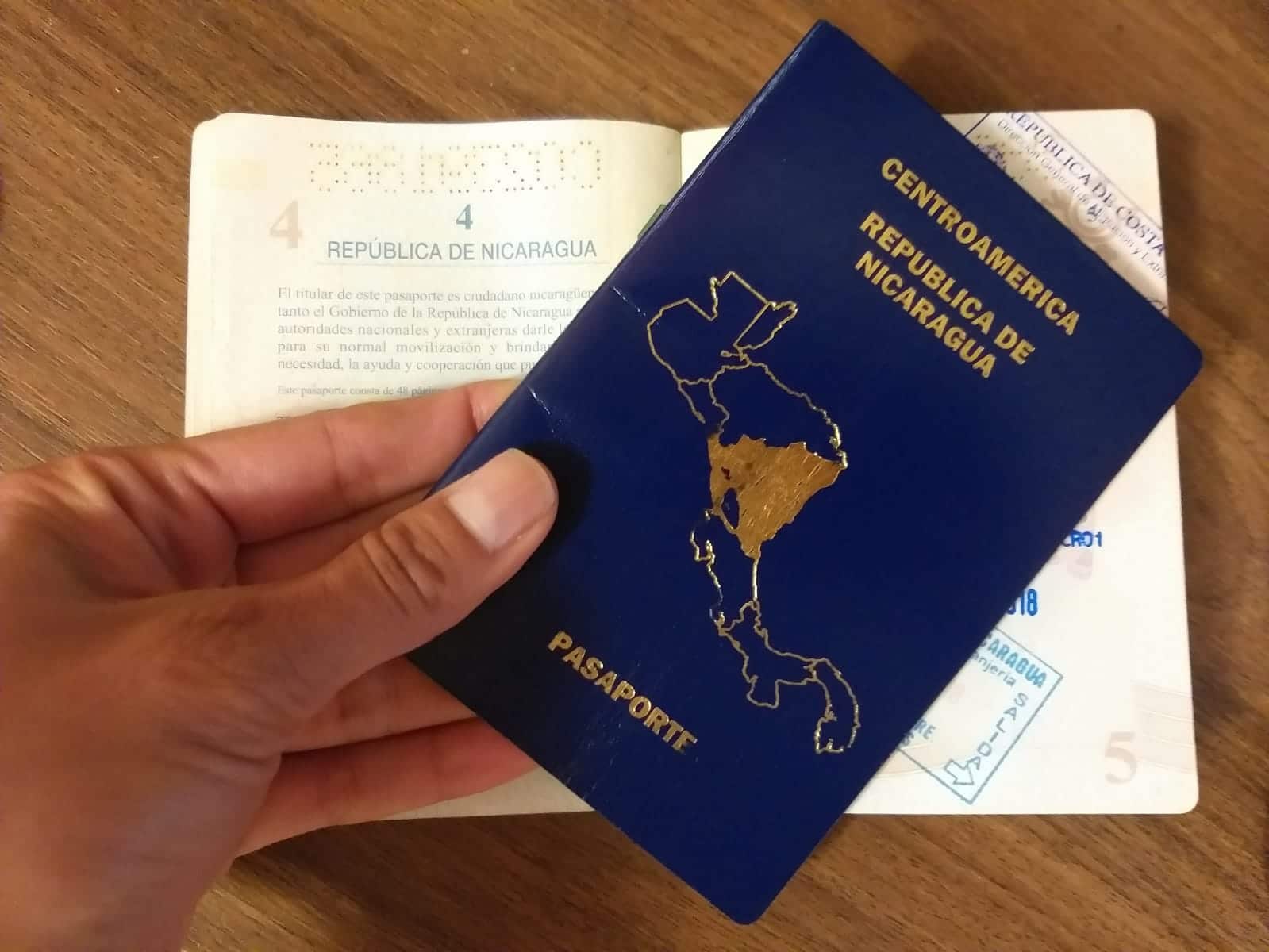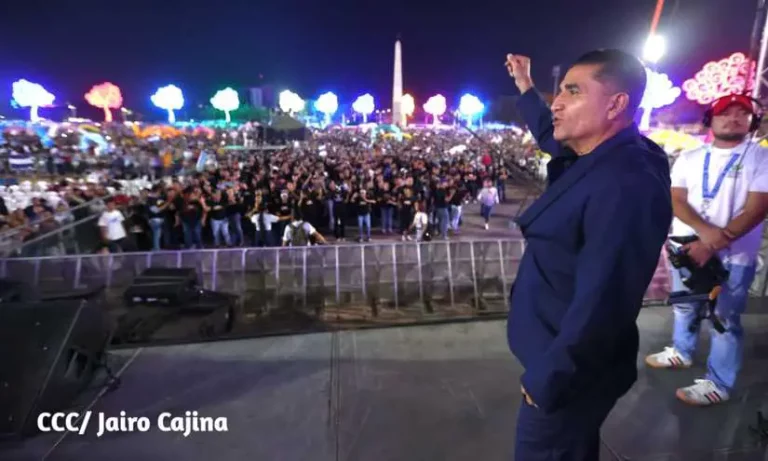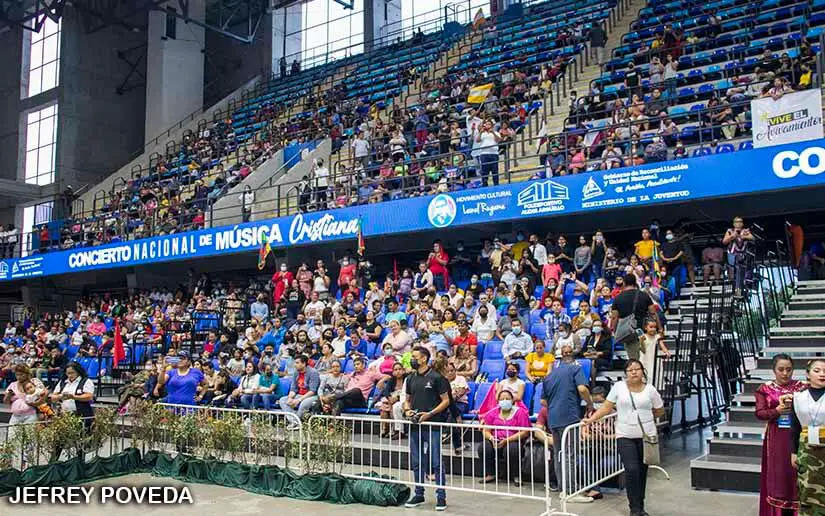1 de mayo 2023

Nicaragua: Public Employees Hindered from Traveling to USA

PUBLICIDAD 1M
PUBLICIDAD 4D
PUBLICIDAD 5D
While the Catholics are prohibited from public activities, evangelical Christian pastors allied with the regime celebrate vigils and concerts in public

Evangelical revival meeting in the “Plaza de la Fe” in Managua, April 21, 2023. Photo from the government website “El 19 Digital”
The patron saints’ procession known as Tope de los Santos is held every April 24 in San Marcos, Carazo. This year, however, instead of the traditional festive parade, the event was restricted to the atrium of the Church, in a new demonstration of the Ortega regime’s persecution and prohibition of the Catholic Church. Three days previously, the dictatorship’s propaganda apparatus was promoting a revival meeting headed by Pastor Omar Duarte, from the Rivers of Life International Ministry. This religious leader was allowed to hold his gathering in Managua’s Plaza de Fe.
“The images showed hundreds of evangelical Protestant believers, expressing their faith. They have a right to do so, as every citizen of this country should have. But at the same time, they’re doing this, we Catholics weren’t allowed to express our beliefs,” laments “Magaly,” who has danced before the saints in Carazo for the last 27 years, as a religious promise.
Magaly noted sadly that her dancing – in the festival as well as in the procession – was very limited. She’s been honoring the saints this way ever since her mother made a religious promise: “if I was saved from a bad illness that had afflicted me.” From then on, she affirms, she’s never failed to participate in San Marcos. “This year, although I danced less, I did so with a lot of devotion,” she insists.
I could see comments on social media that the Protestant pastors held their activities surrounded by Chayopalos [popular term for the metal trees that Nicaraguan Vice President Rosario Murillo ordered placed along the main Managua streets]. People see this as a reflection of the way these pastors are supporting a criminal dictatorship,” Magaly added.
The Ortega dictatorship began 2023 by prohibiting the public realization of the principal Catholic activities in most of Nicaragua’s municipalities, including the traditional Easter Week processions. Many of the Catholic Churches were placed under surveillance, or even surrounded by police.
Since then, Ortega has escalated the persecution of the Catholic Church and imposed surveillance from the police and his agents over the different parishes in the country. In silence, the priests endure sieges and threats. Meanwhile, in the La Modelo Penitentiary Monsignor Rolando Alvarez, Bishop of Matagalpa, is serving an illegal prison sentence of 26 years and four months, imposed by an Ortega-allied court after the Bishop refused to accept banishment from the country.
Nonetheless, the regime has authorized the celebration of concerts and vigils on the part of the evangelical Christian churches. They have even allowed some of them, such as Pastor Omar Duarte of the Rios de Agua Viva [Rivers of Life] Ministry, to use the public plazas and buildings for their activities.
“Regime supports its cronies and flatterers”
Lawyer and researcher Martha Patricia Molina, who has documented the dictatorship’s attacks against the Catholic Church, assures that the support being proportioned to the evangelical pastor’s activities “is because the principal evangelical leaders, not the general community, have been openly complicit with the dictators. They’re their cronies, and in addition their flatterers.”
“Those pastors know their flirtation with the regime yields good returns,” she says. However, she also notes that part of the evangelical community “has been attacked by the dictatorship on a lesser scale,” especially “when they discover that the pastor isn’t openly supporting the crimes against humanity that are being committed in the country.”
Martha Molina clarifies that Nicaraguans, “with no exceptions, have the right to express our religious beliefs in both public and private,” because “even if the government doesn’t have any official religion,” the Constitution guarantees that right.
“But the Ortega-Murillo public administration has truncated this, putting their whims above the Magna Carta. And doing that is a crime.”
At the beginning of 2023, Molina already predicted that this year would be “disastrous” in terms of the repression against the Catholic Church. In addition, she emphasized that Ortega “has the soulless and illogical intention of eliminating the Catholic faith from the country,” because it’s the only institution, “that, in the light of the Gospel, is proclaiming and denouncing all the arbitrary actions and evils the dictatorship commits.”
Sandinista Youth involved in activities of the evangelist sects
On August 7, 2022, the Juventud Sandinista [“Sandinista Youth”], one of the principal organs supporting the repression of citizen protests in the country, promoted a “Christian concert,” together with over 100 Protestant pastors.
The event was held in the Alexis Arguello Stadium, with support from Nicaragua’s Ministry of Youth and the Managua mayor’s office.
The Sandinista Youth have also promoted other events of the evangelical churches in different municipalities of Nicaragua, such as San Rafael del Sur.
“It’s excellent that our brother Christians be supported. However, it’s regrettable that while this is occurring, [the regime] is also trying to silence the prophetic voice of the Catholic Church. The worst thing is that they (the evangelical churches) remain silent about these terrible outrages,” laments “Orlando,” a priest in Carazo, who asked that his real name be withheld for fear of reprisals.
Father “Orlando” states that the Catholic Church in Nicaragua “is living through its hardest days,” despite the fact that when Ortega returned to power, he promised he wouldn’t go back to attacking priests.

A “changing” relationship with the evangelical sects
A 2019 investigation carried out by the online media site La Lupa, revealed that at least 94 evangelical church entities had obtained economic benefits since Daniel Ortega returned to power in 2007.
The report named Reverend Neftali Cortez, president of the National Concilium of Evangelical Churches in Nicaragua, as having received US $341,262 dollars from the Nicaraguan general budget. That was the highest sum allocated to any of the 94 financed congregations that year.
Similarly, the Association of Evangelical Christian Chaplains, headed by Pastor German Jaen Somarriba, received US $253,510. The group included pastors Luis Mendoza, Francisco Melendez and Juan Jose Vanegas. In June of 2018, those same four evangelical leaders had issued a call for peace and reconciliation, in line with the official discourse, despite the fact that the government had begun to implement a massacre of the protesting citizens.
In April 2019, Laureano Ortega Murillo, son of the dictatorial couple, participated in the “Heal our Land” vigil, along with Managua’s mayor Reyna Rueda.
Former deputy Eliseo Nuñez stated that this sudden “religious conversion” – because these government figures had previously been seen attending Catholic Masses – “is a game, where the only thing that’s clear is that they have neither principles nor ideologies.”
“Ortega understands that the evangelical churches have no defined hierarchy. It’s a dastardly thing he’s doing with the evangelical Christian sects, trying to paint them like they’re all his followers. He’s taking advantage of the opportunism of a few pastors, in order to give that image,” Nuñez declared to La Prensa.
On March 21 of the current year, a “Pastoral Letter from the Nicaraguan Council of Evangelical Pastors” was made known, in which they term Ortega a victim of the United States’ “imperial power.”
“The battle for control of Nicaragua’s soul, and that of its people, is a spiritual battle and must be resolved with spiritual arms. The essence of the problem doesn’t lie in the struggle for power between the Nicaraguan government and the opposition, sustained by external forces that have historically caused pain to the Nicaraguan people for over 10 generations,” the letter stressed.
However, Felix, a former pastor of a small evangelical church in Grenada, admits that the Ortega regime’s treatment of the evangelical community has been “changeable.”
“They’ll help you, but in exchange they want you to be unconditionally on their side, so that when they demand that you praise them, you do it; when they ask you to attack someone, you also obey. Otherwise, you’re their enemy,” he specified.
In June 2022, the National Police prohibited the evangelical Christians in some parts of the country from commemorating the 453rd Anniversary of the Bible’s translation into Spanish. At that time, religious sources denounced the move.
“On a national level, there’s an order that no permits will be issued for marches, or concentrations in celebration of the Day of the Bible, just as they’re doing with the Catholic Church, where they’re prohibiting all massive public activities in the streets,” a pastor, speaking anonymously, told 100% Noticias at that time.
On that same occasion, the Nicaraguan Council of Evangelical Pastors circulated a letter indicating that the decision was due to “orientations of the civil authorities,” who had told them the motive was “for the safety of the participants.”
Further, among the NGOs and the universities that have been forcibly closed and confiscated, several belong to evangelical Protestant leaders, among them the Adventist University of Nicaragua.
“They attack everyone who don’t buckle under to their orders, or sing their praises,” Father “Orlando” summarized.
This article was originally published in Spanish in Confidencial and translated by Havana Times

PUBLICIDAD 3M
Confidencial es un diario digital nicaragüense, de formato multimedia, fundado por Carlos F. Chamorro en junio de 1996. Inició como un semanario impreso y hoy es un medio de referencia regional con información, análisis, entrevistas, perfiles, reportajes e investigaciones sobre Nicaragua, informando desde el exilio por la persecución política de la dictadura de Daniel Ortega y Rosario Murillo.
PUBLICIDAD 3D